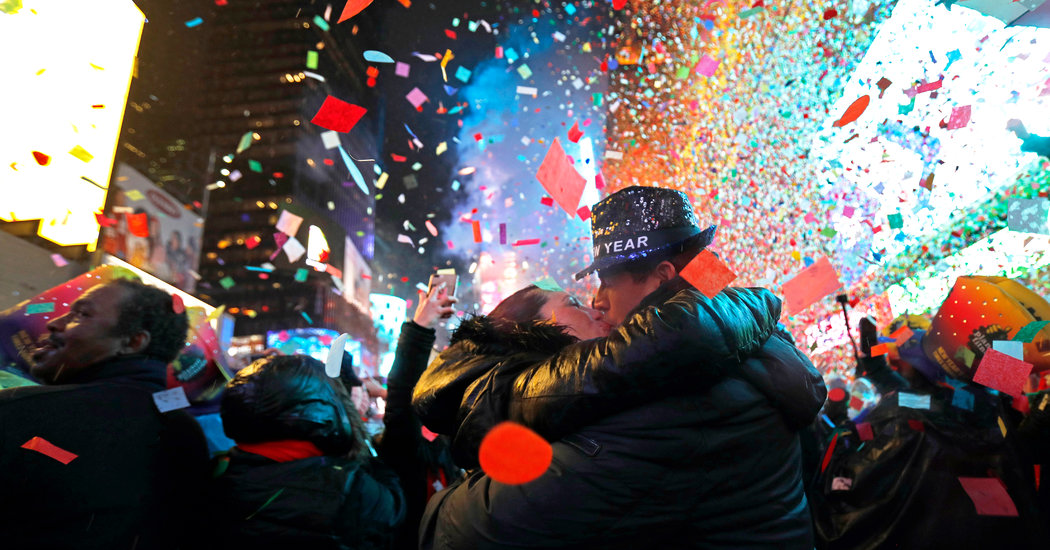
Kiss your lover at midnight. Fling open all your windows and doors. But whatever you do to celebrate the arrival of 2020, don’t eat lobster.
These are some of the superstitions and traditions that, according to some cultures, will help you avoid setbacks and barrel into the new year with good fortune and cheer.
There’s a solid chance you grew up in Pennsylvania if you eat pork and sauerkraut on New Year’s Day; Dutch and German settlers there have been serving it up since the 1800s. In Denmark, dishes are thrown at a neighbor’s door as a sign of friendship. (That’s one way to get rid of chipped plates.)
And what about that midnight kiss? According to Pete Geiger, the editor of the Farmer’s Almanac, a person who kisses their beloved at the stroke of midnight will have 12 months of continued affection. Pity the person who doesn’t — their love will be denied. “For people who are superstitious, that first kiss actually means something,” he said.
[New Year’s Eve photos from around the world.]
New Year’s traditions have for centuries been rooted in the cultures of the communities that observe them. Southern cooks, for example, often serve a pot of Hoppin’ John, a mélange of black-eyed peas, rice, spices and smoked pork, for good luck and fortune. Enslaved people from West Africa brought black-eyed peas to the Carolinas and grew them in their gardens.
Eventually, these recipes made their way to slaveowners’ tables. The 1824 edition of “The Virginia Housewife,” for example, included a hearty recipe for black-eyed pea cakes served with bits of fried bacon.
“Some white Southerners claim that black-eyed peas saved families from starvation during the Union Army’s siege of Vicksburg in the Civil War,” read a 2010 Op-Ed article in The New York Times. “‘The Encyclopedia of Jewish Food’ suggests that it may come from Sephardic Jews, who included the peas in their Rosh Hashana menu as a symbol of fertility and prosperity.”
It’s not just traditional dishes that endure. Many cultures observe “first footing,” a superstition under which the first person to enter a home portends what kind of fortune those who live there will have for the rest of the year. In some cases, the person carries money to ensure prosperity. In others, they leave by a different door.
In Scotland, which was invaded by Scandinavian Vikings more than 1,000 years ago, a dark-haired man carrying a piece of coal, a coin or some whisky would traditionally be welcomed. Many Scots also light bonfires in observance of Hogmanay, the last day of the year.
In Stonehaven, a city in northeastern Scotland, residents parade down the main street swinging flaming balls of fire to ward off evil. The festivities are streamed live on a webcam, and a local brewery makes a Fireballs beer.
“People were afraid of demons and bad spirits and would do anything to make sure things did not hurt them,” Mr. Geiger said. “These traditions are handed down so people feel safe.”
Indeed, while many traditions are rooted in history, some find inspiration in the divine. In Sweden, folklore enthusiasts take a “year walk,” or arsgang, in which they wander through a forest to a church or a graveyard on New Year’s Eve and encounter dark, mythical creatures. These omens were meant to enlighten the solitary walker about marriage, conflict or death.
The ritual, which included visiting fresh graves, was documented as far back as the 1600s, according to an article in Atlas Obscura. “This let the walker tap into the prophetic power of the season,” the article said. “But it also meant opening oneself up to frightening encounters.”
Many new year traditions focus on preparing the home — and by extension, the mind — for better days ahead. Some people open all the doors and windows in their houses at midnight to usher out the old year and invite in the new. “It makes sense,” Mr. Geiger said. “It starts a new sequence. You start the year on a positive note. It’s symbolic as much as anything.”
For his part, Mr. Geiger, who lives in Lewiston, Maine, heads to a cottage on a nearby lake every year, gathering with friends for a spectacular dinner. “It’s the best meal I eat all year,” he said. Does the banquet portend a bountiful year to come, perhaps? Or good fortune in the new year?
“No,” he said with a laugh. “My friend is just a really good cook.”







